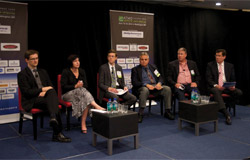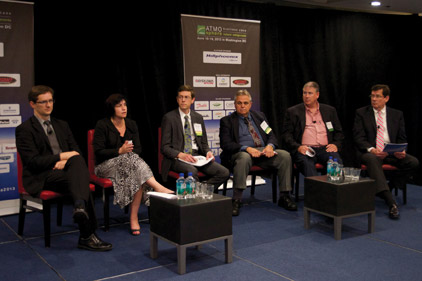
|
| Robert Wilkins, vice president, public affairs, Danfoss (far right), moderates a panel on refrigerant regulatory issues and standards at ATMOsphere America 2013. |
WASHINGTON — Danfoss recently sponsored and participated in ATMOsphere America 2013, a conference which discussed natural refrigerant trends, latest technologies, and regulatory issues in the U.S. and Canada.
During the conference, Robert Wilkins, vice president, public affairs for Danfoss, moderated a panel on refrigerant regulatory issues and standards. Panelists included representatives from the U.S. Department of State, U.S. Environmental Protection Agency (EPA), Underwriters Laboratories (UL), U.S. Department of Energy (DOE), and the Occupational Safety and Health Administration (OSHA).
“On a global stage, with the recent announcement that the U.S. and China have committed to work together and with other countries to use the expertise and institutions of the Montreal Protocol, we’re possibly on the verge of an unprecedented agreement to phase down the consumption and production of HFCs,” said Wilkins in his introductory remarks.
Taking a look at natural refrigerants, Jim Hower, industrial refrigeration sales manager for Danfoss, and CIMCO Refrigeration, presented a technology case study at the conference. Their presentation showcased how the successful installation of an ammonia/CO2 refrigeration system at Canadawide, one of Canada’s largest distributors of fruits and vegetables, is reducing the company’s costs, and addressed how the solution is scalable for mainstream deployment.
Reaching a critical balance of reliable and consistent temperature control, energy savings, environmental responsibility, and equipment and lifecycle costs, dictated the future of warehousing at Canadawide and the company’s ability to deliver freshness. The ammonia/CO2 system saved Canadawide nearly 20 percent in maintenance costs, first costs, and operating costs, with the most significant reductions in operating costs.
“The maxim in our industry is that no single refrigerant is suitable for all applications, but natural refrigerants can be used in many applications,” Wilkins said. “However, this does not ensure sustainability. Energy efficiency, affordability, safety, and product maturity is a long journey.
“But, in order for the industry to move forward, there are several critical factors that need to be addressed and aligned: investment cost, lifecycle cost, complexity, risk awareness, market readiness, technical ability, environmental consciousness, and standards and legislation.”
ATMOsphere America 2013 promoted the business case for natural refrigerants in North America. The event convened decision makers from leading retailers, suppliers, associations, and more. Topics for presentations and workshops explored end users (retailers and consumer brands) as well as technology providers from the commercial and industrial refrigeration, and air conditioning and heat pump sectors. The event also looked at market trends and regulations, standards, and training as they relate to natural refrigerants.
Publication date: 8/19/2013
Want more HVAC industry news and information? Join The NEWS on Facebook, Twitter, and LinkedIn today!


Report Abusive Comment